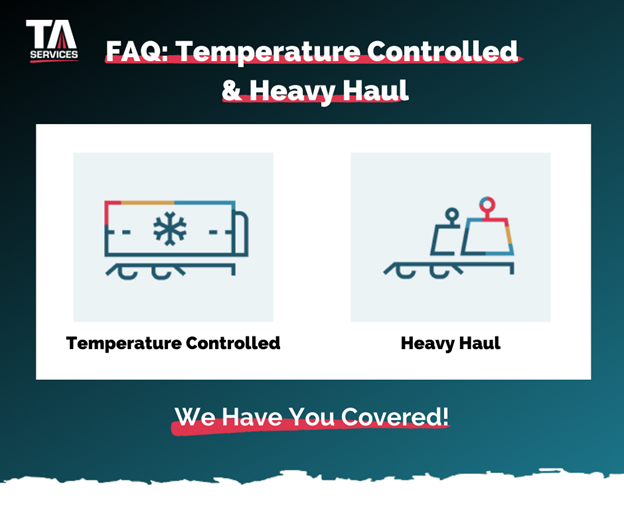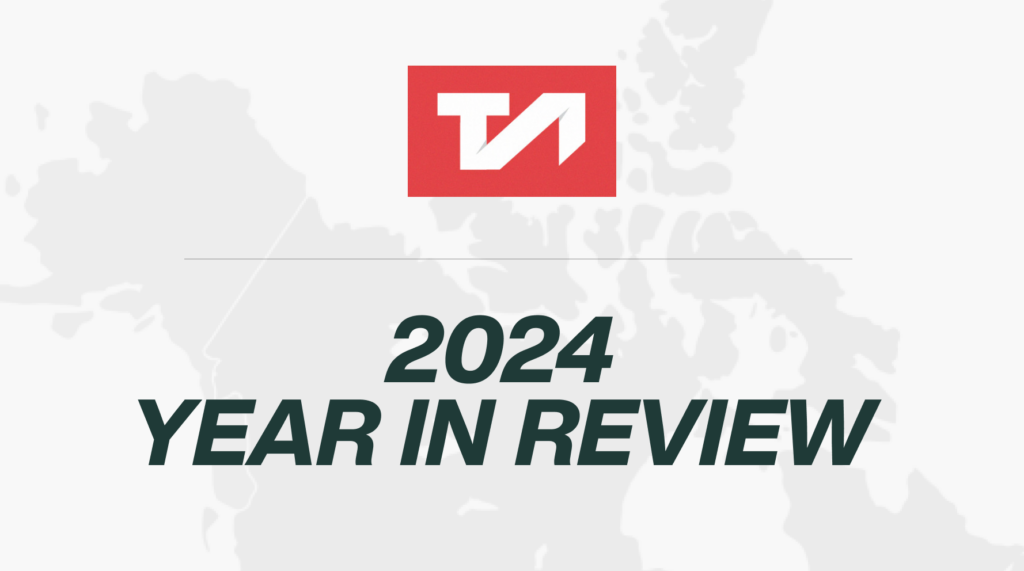Mar 11, 2022
Everything You Need to Know about Temperature Controlled Freight and Heavy Haul

Welcome back to our series on specialty freight. In this series we cover the ins and outs of the products less commonly transported and discuss 3PL solutions for transportation of any size or other unique requirements. In case you missed it, check out part two covering all things less-than-truckload (LTL) and extreme length.
Part four of our series focuses on both the need for refrigerated trucks for transporting temperature-sensitive products and utilizing specialized equipment to accommodate oversized loads. Choosing the right 3PL provider for your specialty freight needs can be challenging and overwhelming, but our 3PL experts can help. Read on to get answers to the most frequently asked questions about temperature controlled freight and heavy haul for optimal supply chain management.
What you should know about temperature controlled freight
What is temperature controlled freight?
These loads must maintain consistent temperatures as they are transported from one place to another. Cargo for these loads often includes anything from fresh produce, meat, plants, to pharmaceuticals and other temperature-sensitive commodities.
What equipment is used for temperature controlled shipments?
Refrigerated trailers (also called “reefer” containers) are used to transport temperature controlled freight. These trucks come equipped with a reefer unit that sets and controls the temperature within the trailer. The trailer also has additional layers of insulation on the walls to ensure your cargo is kept cool.
What temperature is a refrigerated truck?
The temperature range differs from shipment to shipment. Some commodities require frozen temperature ranges, while others can be transported at refrigerated or higher temperature ranges. Most refrigerated trucks are equipped to maintain temperatures between -20°F and 50°F. When planning a shipment, it is important to go over the specifications and temperature requirements with your carrier.
Does shipping with temperature controls cost more?
Due to the added weight of the reefer unit limiting payload capacity, as well as the reduced interior space resulting from the thicker insulated walls, shipping temperature controlled freight often drives higher rates. Rates are also affected by seasonal demands for cargo that is commonly shipped using temperature controlled trucks. For example, when the demand for produce is highest, typically in the summer months, you’ll find rates tend to be higher.
Does temperature controlled shipping only include cold storage?
Most temperature controlled shipping focuses on refrigerated goods, but there is also a time and place for keeping cargo above a certain temperature. Finding a 3PL partner who is well-versed in temperature controlled logistics operations will ensure your needs are met, regardless of the requirements.
When you’re planning your next temperature controlled shipment, don’t forget to…
● Work with your carrier to set parameters and protocols for how your cargo is handled and what temperature range should be maintained from the time it is picked up to the time it is unloaded.
● Account for demand changes throughout the year and what those changes mean for your rates and budget.
Answering your questions about heavy haul
What is considered heavy haul?
A heavy haul shipment describes freight that exceeds the legal size and weight limitations for freight. These limitations vary by state (and sometimes county), so you’ll need to work with your carrier to assess your shipments. On average, the legal limitations for freight are:
● Width: 8.5 feet
● Height: 13.5 feet
● Trailer Length: 48 – 53 feet
● Gross Weight: 80,000 lbs.
What accommodations are needed when shipping oversized freight?
Oversized freight is not authorized on every roadway, so special routing or permit accommodations may be necessary. Find a trusted carrier who is well-versed in these requirements to handle acquiring any necessary permits.
Depending on the shipment route, some especially wide loads may require an escort vehicle. And in the rare cases that a shipment weighs more than 150,000 pounds, shipment oversight and increased safety measures are necessary. Working with a partner that has an extensive background in heavy haul shipments will help ensure these extra-large loads are properly transported.
What equipment is required for heavy haul shipments?
Double-drop, extendable, multi-axle, steerable, flatbed, and step-deck stretch are just some of the specialized trailers that may be required for heavy haul shipments. For example, there are specific weight restrictions depending on the type and number of axles. This is dictated on the state level, so it’s important to work with your carrier to make accommodations based on the individual shipment and route.
In addition to specialty trailers, you may need equipment such as cranes or forklifts to load and unload your freight.
Does heavy haul cost more?
Rates will be higher given the specialty equipment that is required for heavy/oversized loads. You need to consider that heavier loads burn more fuel than average. Permits also come with added costs. While your carrier should handle applying for any necessary permits, the costs will fall to the shipper.
Next time you’re shipping something heavy or extra-large, remember…
● Don’t guess at dimensions. Knowing your shipment’s exact width, height, length, and weight is critical for ensuring your carrier has the proper permits and routes planned.
● Make sure you and your carrier are prepared with any necessary equipment for loading or unloading your freight.
● Prepare as much as possible, but expect the unexpected. Even if you and your carrier do everything right, things like unexpected construction and weather can cause last-minute route changes or delays.
At TA Services, we have 35 years of experience helping shippers like you manage everything that goes into a strategic and efficient transportation program and logistics operation, including temperature controlled shipping and heavy haul. We provide exceptional supply chain management to keep you in-line with your goals, whatever they may be. Make sure you come back for the fourth installment of this five-part series, where we’ll be discussing expedited, high-value, and hazmat shipments.
Get in touch with TA Services for a quote on your next freight shipment.



